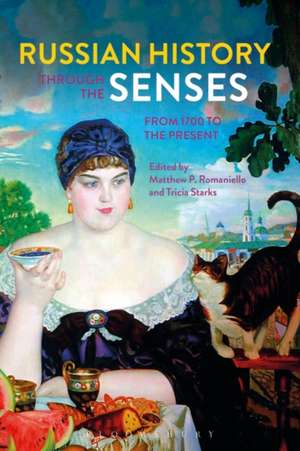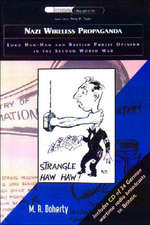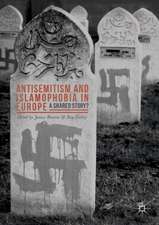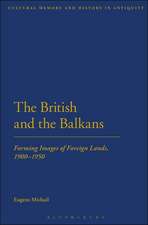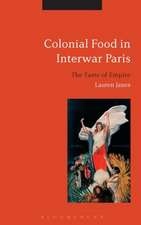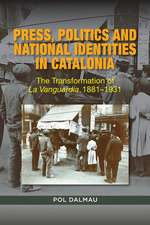Russian History through the Senses: From 1700 to the Present
Editat de Professor Matthew P. Romaniello, Professor Tricia Starksen Limba Engleză Paperback – 21 sep 2016
| Toate formatele și edițiile | Preț | Express |
|---|---|---|
| Paperback (1) | 181.77 lei 3-5 săpt. | |
| Bloomsbury Publishing – 21 sep 2016 | 181.77 lei 3-5 săpt. | |
| Hardback (1) | 716.15 lei 6-8 săpt. | |
| Bloomsbury Publishing – 21 sep 2016 | 716.15 lei 6-8 săpt. |
Preț: 181.77 lei
Preț vechi: 209.42 lei
-13% Nou
Puncte Express: 273
Preț estimativ în valută:
34.79€ • 35.85$ • 29.37£
34.79€ • 35.85$ • 29.37£
Carte disponibilă
Livrare economică 10-24 februarie
Preluare comenzi: 021 569.72.76
Specificații
ISBN-13: 9781474263122
ISBN-10: 1474263127
Pagini: 320
Ilustrații: 30 BW Illus
Dimensiuni: 156 x 234 x 18 mm
Greutate: 0.5 kg
Editura: Bloomsbury Publishing
Colecția Bloomsbury Academic
Locul publicării:London, United Kingdom
ISBN-10: 1474263127
Pagini: 320
Ilustrații: 30 BW Illus
Dimensiuni: 156 x 234 x 18 mm
Greutate: 0.5 kg
Editura: Bloomsbury Publishing
Colecția Bloomsbury Academic
Locul publicării:London, United Kingdom
Caracteristici
Includes a range of case studies, covering subjects like the World Wars, Stalin's Russia, food, drink, medicine and commerce
Notă biografică
Matthew P. Romaniello is Associate Professor of History at the University of Hawaii at Manoa, USA. He is the author of The Elusive Empire: Kazan and the Creation of Russia, 1552-1671 (2012), and the co-editor of three volumes, including Tobacco in Russian History and Culture from the Seventeenth Century to the Present (2009) with Tricia Starks.Tricia Starks is Associate Professor of History at the University of Arkansas, USA. She is the author of The Body Soviet: Propaganda, Hygiene and the Revolutionary State (2008) and is completing a monograph on smoking in modern Russia.
Cuprins
List of MapsList of Illustrations1. Introduction: The Sensory in Russian and Soviet History - Alexander M. Martin, University of Notre Dame, USAPart I - Imperial Russia2. Humoral Bodies in Cold Climates - Matthew P. Romaniello, University of Hawaii, USA3. Fermentation, Taste and Identity - Alison K. Smith, University of Toronto, Canada4. Market Pleasures and Prostitution in St. Petersburg - Abby Schrader, Franklin and Marshall College, USAPart II - Revolutionary Russia5. The Taste, Smell, and Semiotics of Cigarettes - Tricia Starks, University of Arkansas, USA6. The Sounds, Odors, and Textures of Russian Wartime Nursing - Laurie Stoff, Arizona State University, USA7. The Taste of Kumyshka and the Debate over Udmurt Culture - Aaron Retish, Wayne State University, USAPart III - Soviet Russia8. Engineering Tastes: Food and the Senses - Anton Masterovoy, City College of New York, USA9. Deafness and the Politics of Hearing - Claire Shaw, University of Bristol, UK10. Sensing Danger: The Red Army during the Second World War - Steven G. Jug, Baylor University, USAPart IV - Reconstructing Russia11. The Sensory Experience of Martyrdom and Soviet Collective Memory - Adrienne Harris, Baylor University, USA12. Stalinism's Sights and Smells in the Films of Aleksei German, Sr. - Tim Harte, Bryn Mawr College, USASelected bibliographyIndex
Recenzii
This study is an engaging interdisciplinary investigation of the sense in the specifically Russian context, which will be useful to those interested in sensory studies, Russian History, everyday culture, literature, and film, as well as those studying discourses on national identity, colonialism, social mobility and social engineering, personal and collective experiences, and memory.
With its broad sweep in time and careful attention to issues lying just below the surface, Russian History through the Senses deserves to be read by scholars seeking fresh inspiration from clearly written articles based upon a close examination of new primary sources.
[A] set of essays that opens doors into long familiar topics and establishes some new and exciting avenues of research . In addition to its own significant contributions to the history of sensation, this volume suggests that much more worth pursuing may be lurking within the inexpressible realm of the senses.
This attention to the centrality, and often "intersensorality," of seeing, hearing, smelling, tasting, and touching in how we experience and interpret the external world, as Alexander Martin's excellent introduction underscores, has led to new understanding of key historical questions ... [the book] offers new and enlightening ways to see and think about the experience of Russian and Soviet history.
Fascinating ... I would recommend this book to anyone interested in Russian history and in the methodology of historical inquiry. I would also recommend it to skeptics and pragmatists, who can taste how not only historical fiction, but also historical scholarly works, can contribute to what Peter C. Hoffer called 'the highest purpose of historical scholarship: to make the past live again'.
The articles in the book are of uniformly high quality, each richly informative.
All the essays are lucidly written.
A significant contribution to the new history of the senses, this innovative volume offers a panoply of articles showcasing how attention to the senses - touch, smell, sight, hearing, taste - can open up new vistas on some three centuries of Russian history. From travelers' experience of the cold climate in the eighteenth century or the cultural meanings of fermented, sour-tasting Russian rye bread through to soldiers' and nurses' sensory experience of war in the twentieth century, this collection takes readers on a veritable tour of modern Russia, exploring the making of national, imperial, social and gender identities as well as the sensory dimensions of memory, consumption, sociability, and state power. I recommended it to a broad readership.
Russian History through the Senses brings the sensations of the past to life - but this volume also analyses them as a fascinating mirror of cultural meanings. In diverse and stimulating essays the authors make highly original contributions to histories of wars, empire, medicine, economics, cinema, and many other fields of Russian history. Fascinating and stimulating.
The remarkable collection, with its wide ranging, well researched and theoretically informed essays on the experiences of the senses, complements our literature on emotions and is essential reading for everyone interested in Russian and Soviet subjectivity.
With its broad sweep in time and careful attention to issues lying just below the surface, Russian History through the Senses deserves to be read by scholars seeking fresh inspiration from clearly written articles based upon a close examination of new primary sources.
[A] set of essays that opens doors into long familiar topics and establishes some new and exciting avenues of research . In addition to its own significant contributions to the history of sensation, this volume suggests that much more worth pursuing may be lurking within the inexpressible realm of the senses.
This attention to the centrality, and often "intersensorality," of seeing, hearing, smelling, tasting, and touching in how we experience and interpret the external world, as Alexander Martin's excellent introduction underscores, has led to new understanding of key historical questions ... [the book] offers new and enlightening ways to see and think about the experience of Russian and Soviet history.
Fascinating ... I would recommend this book to anyone interested in Russian history and in the methodology of historical inquiry. I would also recommend it to skeptics and pragmatists, who can taste how not only historical fiction, but also historical scholarly works, can contribute to what Peter C. Hoffer called 'the highest purpose of historical scholarship: to make the past live again'.
The articles in the book are of uniformly high quality, each richly informative.
All the essays are lucidly written.
A significant contribution to the new history of the senses, this innovative volume offers a panoply of articles showcasing how attention to the senses - touch, smell, sight, hearing, taste - can open up new vistas on some three centuries of Russian history. From travelers' experience of the cold climate in the eighteenth century or the cultural meanings of fermented, sour-tasting Russian rye bread through to soldiers' and nurses' sensory experience of war in the twentieth century, this collection takes readers on a veritable tour of modern Russia, exploring the making of national, imperial, social and gender identities as well as the sensory dimensions of memory, consumption, sociability, and state power. I recommended it to a broad readership.
Russian History through the Senses brings the sensations of the past to life - but this volume also analyses them as a fascinating mirror of cultural meanings. In diverse and stimulating essays the authors make highly original contributions to histories of wars, empire, medicine, economics, cinema, and many other fields of Russian history. Fascinating and stimulating.
The remarkable collection, with its wide ranging, well researched and theoretically informed essays on the experiences of the senses, complements our literature on emotions and is essential reading for everyone interested in Russian and Soviet subjectivity.
Descriere
Bringing together an impressive cast of well-respected scholars in the field of modern Russian studies, Russian History through the Senses investigates life in Russia from 1700 to the present day via the senses. It examines past experiences of taste, touch, smell, sight and sound to capture a vivid impression of what it was to have lived in the Russian world, so uniquely placed as it is between East and West, during the last three hundred years. The book discusses the significance of sensory history in relation to modern Russia and covers a range of exciting case studies, rich with primary source material, that provide a stimulating way of understanding modern Russia at a visceral level.
Russian History through the Senses is a novel text that is of great value to scholars and students interested in modern Russian studies.
